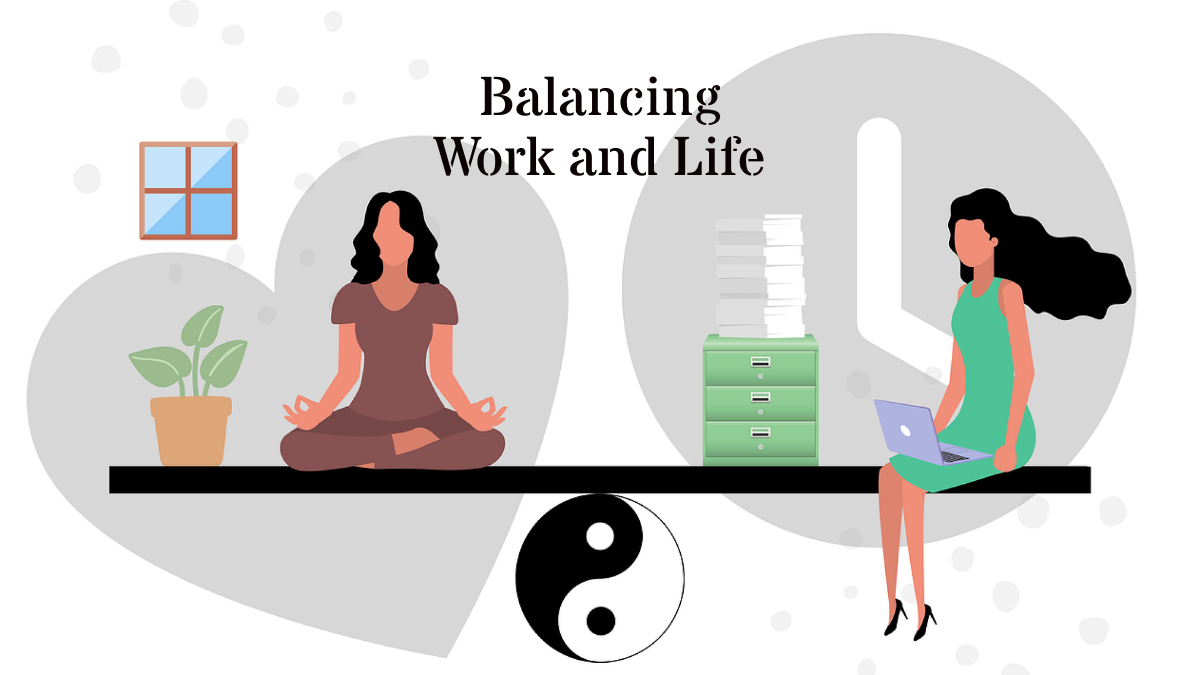Table of Contents
In today’s busy world, it can be challenging to find the right balance between work and personal life. Many people struggle to juggle the demands of their jobs with the need to spend quality time with family and friends, pursue hobbies, and take care of their own well-being. However, achieving harmony between work and life is essential for overall happiness and fulfilment. In this blog, we’ll explore some simple strategies that can help you strike the right balance and lead a more balanced and fulfilling life.
“The key to balance is not better time management, but better boundary management.” – Betsy Jacobson
Set Clear Boundaries
Setting clear boundaries between work and personal life is crucial for achieving balance. This involves defining specific times when you will focus solely on work and other times when you will prioritize your personal life. For instance, you might establish a rule not to check work emails after a certain time in the evening or on weekends, allowing yourself to fully disconnect and recharge.
By setting these boundaries, you create a clear separation between your professional responsibilities and your personal time. This separation is essential for maintaining your well-being and preventing burnout. When you have dedicated time for both work and personal activities, you can give your full attention to each without feeling overwhelmed or distracted by competing demands.
Prioritize Tasks
Not all tasks are of equal importance, so it’s essential to prioritize effectively to make the most of your time. Start by identifying the most critical tasks both at work and in your personal life. These are the tasks that align most closely with your goals and values, and completing them will have the most significant impact.
Once you’ve identified your priorities, focus your energy on completing these tasks first. This helps prevent you from getting bogged down by less important tasks and ensures that you’re making progress on the things that truly matter. By prioritizing effectively, you can avoid feeling overwhelmed and maintain a sense of control over your workload.
Schedule Downtime
Just as you schedule meetings and appointments, it’s essential to schedule downtime for yourself. This could be as simple as setting aside an hour each day to relax and unwind or planning regular vacations or weekend getaways to recharge your batteries.
Taking time for yourself is essential for maintaining your mental and emotional well-being. It allows you to rest and recharge so that you can approach your work and personal life with renewed energy and focus. By scheduling downtime, you prioritize self-care and ensure that you have the time and space to relax and enjoy life outside of work.
Delegate and Outsource
Delegating tasks involves assigning responsibilities to others, whether at work or at home, instead of trying to handle everything by yourself. It’s about recognizing that you have limited time and energy and that you can’t do everything alone. For example, at work, you might delegate tasks to colleagues who have the necessary skills and capacity to help. This could involve assigning certain aspects of a project to different team members or asking for assistance with administrative tasks. By delegating, you can distribute the workload more evenly and ensure that tasks are completed efficiently.
Outsourcing, on the other hand, involves hiring external professionals or services to take care of specific tasks or responsibilities. For instance, you might hire a cleaning service to help with household chores, a virtual assistant to manage your schedule and emails, or a freelance graphic designer to create marketing materials for your business. Outsourcing allows you to focus on activities that require your unique skills and expertise, while others handle routine or time-consuming tasks. Both delegating and outsourcing can help free up your time, reduce stress, and allow you to focus on the things that matter most to you.
Learn to Say No

Learning to say no is an essential skill for maintaining balance in your life. It’s okay to decline additional work or commitments, especially when they encroach on your personal time. Setting boundaries and prioritizing your own needs is crucial for preventing burnout and maintaining your overall well-being.
When considering whether to say no, think about whether the request aligns with your priorities and values. If it doesn’t, don’t be afraid to decline politely. Remember that saying no allows you to protect your time and energy for the things that are most important to you.
Practice Mindfulness
Mindfulness is a practice that involves being fully present in the moment and paying attention to your thoughts, feelings, and surroundings without judgment. It’s about being aware of what’s happening within and around you, without getting caught up in past regrets or future worries. Mindfulness can be cultivated through various techniques, such as mindfulness meditation, mindful breathing, or simply paying attention to everyday activities with intention and awareness.
By incorporating mindfulness into your daily routine, you can reduce stress and anxiety, increase self-awareness, and improve your overall well-being. For example, you might start your day with a short meditation session to center yourself before diving into work. Throughout the day, you can practice mindful breathing exercises to calm your mind and stay focused on the present moment. By making mindfulness a habit, you can learn to manage your emotions more effectively, respond to challenges with greater resilience, and cultivate a greater sense of peace and contentment in your life.
Set Realistic Goals
Setting realistic goals involves identifying specific objectives that are achievable within a reasonable timeframe, given your resources and circumstances. It’s about being honest with yourself about what you can realistically accomplish and avoiding the trap of trying to do too much at once. When setting goals, it’s essential to break them down into smaller, more manageable tasks that you can tackle one step at a time. This not only makes your goals more achievable but also allows you to track your progress and celebrate your successes along the way.
For example, if your goal is to improve your physical fitness, you might start by setting smaller goals such as going for a 30-minute walk three times a week or gradually increasing the number of push-ups you can do each day. By breaking your larger goal into smaller, more achievable tasks, you can build momentum and stay motivated to keep moving forward. It’s also important to be flexible and willing to adjust your goals as needed to reflect changes in your priorities or circumstances. By setting realistic goals and taking consistent action towards achieving them, you can create a sense of purpose and direction in your life.
Stay Flexible
Flexibility is the ability to adapt to changing circumstances and respond effectively to unexpected events or challenges. It’s about being open to new possibilities and willing to adjust your plans as needed to stay on course. In today’s fast-paced world, life is often unpredictable, and things don’t always go according to plan. Instead of getting frustrated or upset when things don’t go your way, it’s essential to stay flexible and approach challenges with a positive attitude.
For example, if a project at work gets delayed due to unforeseen circumstances, instead of dwelling on the setback, focus on finding creative solutions and adapting your approach to meet the new deadline. Similarly, in your personal life, if plans change at the last minute, try to see it as an opportunity to try something new or spend quality time with loved ones in a different way. By staying flexible and embracing change, you can navigate life’s ups and downs with greater ease and resilience. Remember that flexibility is key to maintaining balance in the long run, allowing you to adjust your course as needed and continue moving forward towards your goals.
Overall, finding a balance between work and life is an ongoing process that requires attention and effort. By setting clear boundaries, prioritizing tasks, and taking care of your well-being, you can achieve harmony and lead a more fulfilling life. Remember that it’s okay to ask for help when you need it and to make adjustments along the way. With patience and perseverance, you can find the balance that works best for you.















